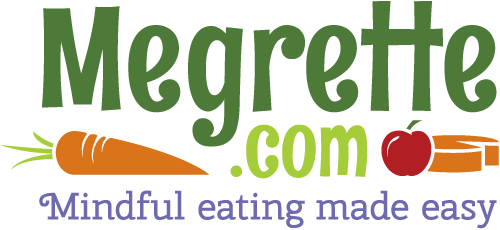Mindful Eating is a big concept that has captured the hearts of health care professionals and the minds of leading researchers. It makes sense, because the roots of Mindful Eating are so positive, and include non-judgment, meditation, and self-kindness. You can learn more about The 3 Roots of Mindful Eating and download this free ebook.
Many professionals find that it isn’t easy to determine if a program is really “mindful”? Dietitians and health-care providers are having trouble differentiating restrictive-eating plans from non-restrictive-eating plans. I know I have often been duped by the slick headlines and enticing promises. Many of you have reached out and asked, “What are some ways to determine if something is a mindful eating program?” and I wanted to share some ideas.
- Do a gut check and ask, “Is this promotion creating the conditions for shame to emerge?” When you do your gut check, hold in your heart that programs that promote shame (body, image, food, size, weight) are toxic in nature and stop the change process. Shame is a form of harming, and promoting change by engaging in shame, is always damaging to the client. Mindful Eating Programs are nonjudgmental to heal the pain associated with food and body shame.
- “Does it promote the concept of self-kindness or self-care as a goal?” If yes, this is a good sign, but determine if the suggested self-care focus is tied to weight or appearance based outcome? If it is, this isn’t mindful eating. Mindful Eating teaches acceptance and self-care by promoting Health At Every Size, HAES.
- “Does it include mindfulness instruction?” This means that one of the primary skills that you will learn and practice in a mindful eating programs is how to pause and “check in.” Intentionally pausing can be accomplished in a variety of ways, including learning about hunger and fullness, or engaging in a Body, Mind and Heart Scans before eating. Mindful Eating Programs incorporate internal information to guide decisions to begin or stop eating. Effective Mindful Eating Programs weave a consistent contemplative practice such as yoga, prayer, or meditation that supports and deepens awareness in a mindful eating program. Mindful Eating Programs practice mindfulness as a foundational aspect of their program.
- “Does it meet The Center for Mindful Eating Principles of Mindful Eating?”
- “Does it meet the Center’s position statement on weight concerns and healthy eating?” Mindful Eating is a HAES compliant counseling and behavior change technique. Here are a few examples mindful eating programs that are also HAES: Am I Hungry, Eating for Life, Mindful Eating and Conscious Living, Self-compassion Eating Awareness Training, and Green Mountain at Fox Run.
- See the Reg Flags: Programs that make promises about a future outcome are NOT a mindful eating program. Talking about weight loss, guarantees or a “new you” or suggest, “After two weeks on this mindful eating plan, your cravings for sweets will be eliminated, guaranteed!” Are NOT creating a present moment focus. Listen for suggestions to restrict, eliminate, or to eat specific foods. This is a sure sign the program is not mindful eating. For example, “Break your addiction to sugar,” or “Enjoy my 10-day mindful eating, gluten free, a clean eating program”.
Learn more about the “Big Picture” of mindful eating by reading The Core Concepts of Mindful Eating: Professional Edition. This comprehensive book is written by Mindful Eating pioneer, Megrette Fletcher M.Ed., RD, CDE who has provided easy to use resources and teaching materials that are HAES compliant for over a decade. Her training tools and programs are designed for dietitians, diabetes educators, nutritionist, coaches, health care professionals, educational institutions and wellness focused corporations.

